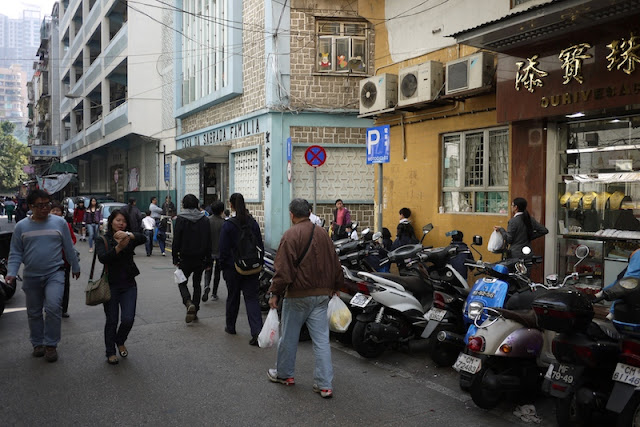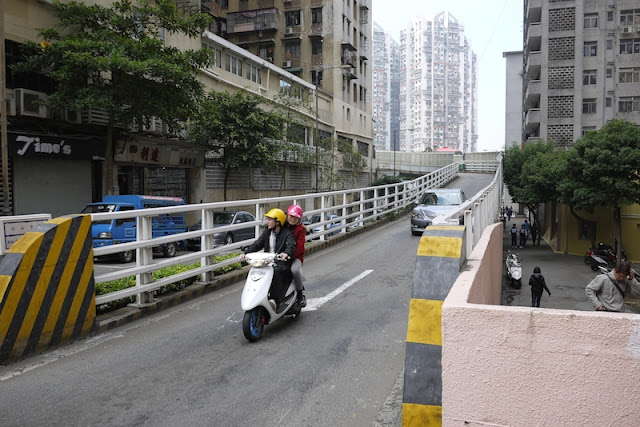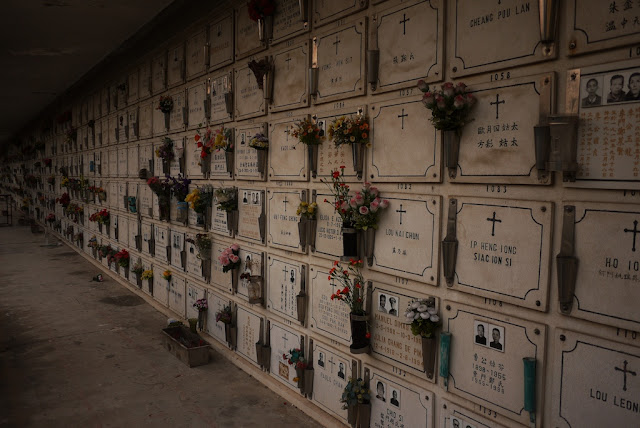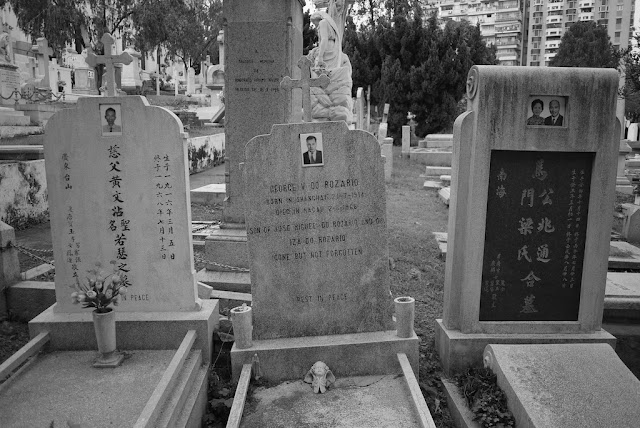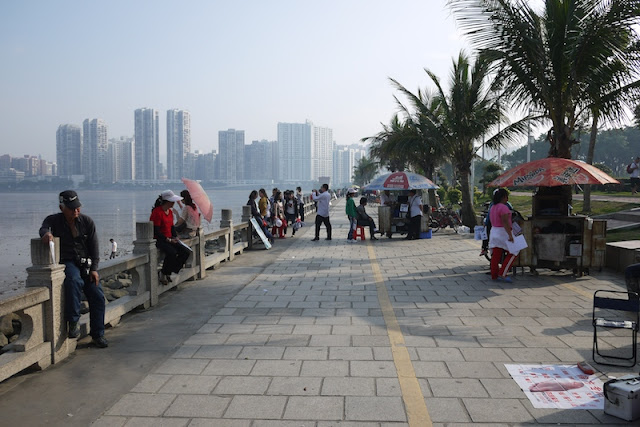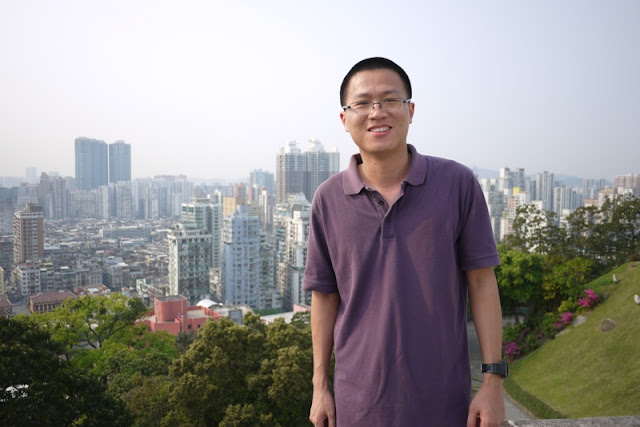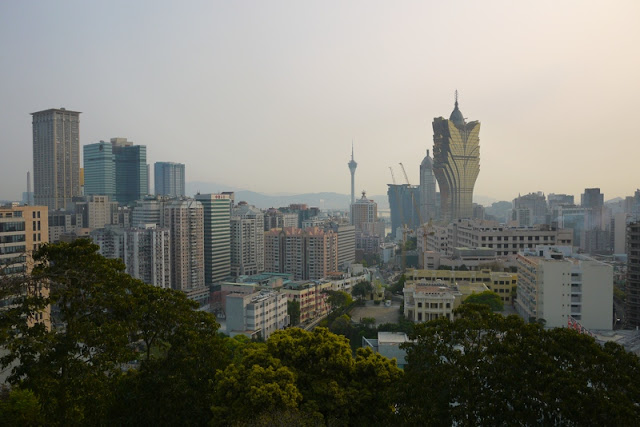Far (in Macanese terms) from Macau's Coloane Village, the northernmost region of Macau sits on a peninsula connected to the Chinese city of Zhuhai. Macau Peninsula includes a number of casinos and historical areas frequented by visitors, including Guia Hill, but I most enjoy meandering through its numerous narrow streets and alleys. Based on where I have been in the past, sometimes they can feel somewhat like Tapei and othertimes somewhat like Madrid. However, its mix of Cantonese and Portuguese cultures, which can be felt in so many ways, sets Macau apart from anywhere else. It is simply a Macanese experience.
Showing posts with label Macau. Show all posts
Showing posts with label Macau. Show all posts
Sunday, July 29, 2012
Friday, July 27, 2012
Scenes of Coloane Village, Macau
Posted by
Brian Glucroft
at
9:19 PM
Since I recently enjoyed some blue skies in Macau, I will take a break from Shanghai and share several series of photos from a special city with a fascinating mix of Cantonese and Portuguese culture. Below are a handful of scenes from Coloane Village which is in the southernmost portion of Macau -- about an hour away by bus from Macau's border with Zhuhai. The buildings provide a taste of old Macau which feels rather different from Macau's new immense casinos. At least when I visited on a weekday in March it did not feel overwhelmed with tourists, and it maintained a small village charm.
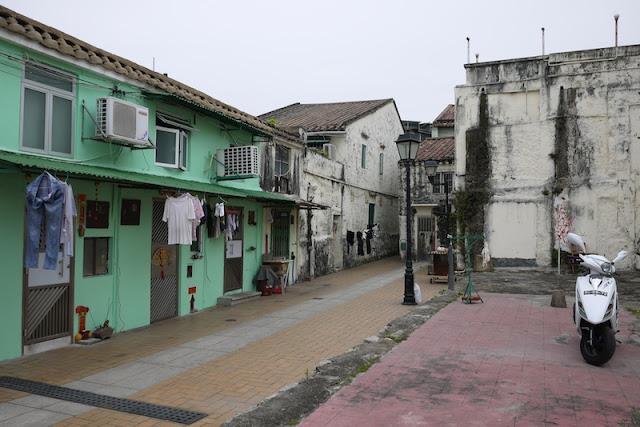 |
| Homes |
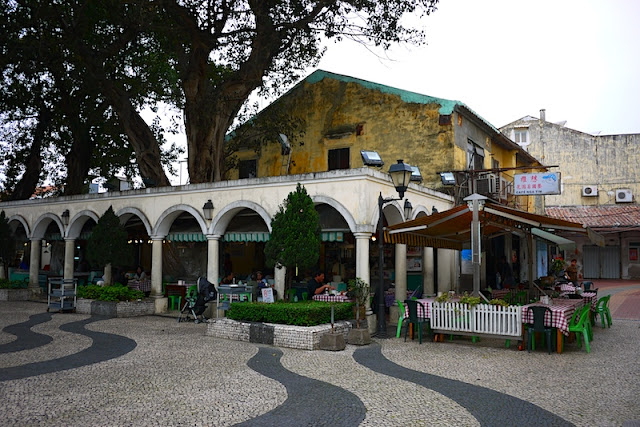 |
| Where I had a Macanese lunch |
 |
| At Old Tin Hau Temple |
 |
| Quiet lane |
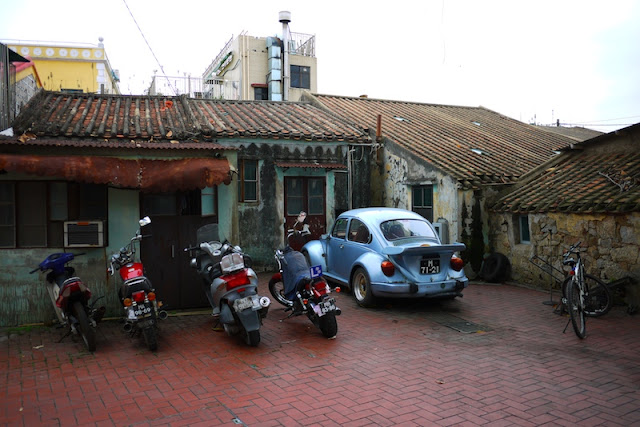 |
| More homes |
 |
| Famous Lord Stow's Bakery |
 |
| One of Macau's delicacies from Lord Stow's -- a Portuguese egg tart |
 |
| Looking across the water at Zhuhai's Hengqin Island |
Wednesday, July 25, 2012
The Future Intercity Railway Station at the Macau-Zhuhai Border
Posted by
Brian Glucroft
at
5:37 PM
[Update at end]
In February I wrote a post about the variety of transportation methods I used to travel from Guangzhou to Zhuhai to Macau. The trip began with a subway ride to the large Guangzhou South Train Station (see the post for photos of some impressive architecture) and ended with me in Macau after having walked across its border with Zhuhai. One of the highlights of the trip was the high-speed train on the Guangzhou-Zhuhai Intercity Railway. Unfortunately, at the time it only reached as far as northern Zhuhai, and a long taxi or bus ride was needed to get to more central locations.
Someday the line will extend to Zhuhai border with Macau at Gongbei Port in central Zhuhai. Although some online sites currently claim this extension will open this month, I think I have some good evidence from last week that more time will be needed for its completion:
Although it is not yet open, progress appears to be continuing on what should be a convenient transportation method for some of the people traveling to Macau -- even if all they want to do is buy safe baby formula, gamble large amounts of money, or eat good Portuguese food. And it is yet another sign that China's infrastructure is continuing to grow.
Update (March 4, 2013): The Zhuhai Train Station is now open. See the more recent post "The Good and Bad of the Extended High-Speed Guanzhou-Zhuhai Intercity Railway".
In February I wrote a post about the variety of transportation methods I used to travel from Guangzhou to Zhuhai to Macau. The trip began with a subway ride to the large Guangzhou South Train Station (see the post for photos of some impressive architecture) and ended with me in Macau after having walked across its border with Zhuhai. One of the highlights of the trip was the high-speed train on the Guangzhou-Zhuhai Intercity Railway. Unfortunately, at the time it only reached as far as northern Zhuhai, and a long taxi or bus ride was needed to get to more central locations.
Someday the line will extend to Zhuhai border with Macau at Gongbei Port in central Zhuhai. Although some online sites currently claim this extension will open this month, I think I have some good evidence from last week that more time will be needed for its completion:
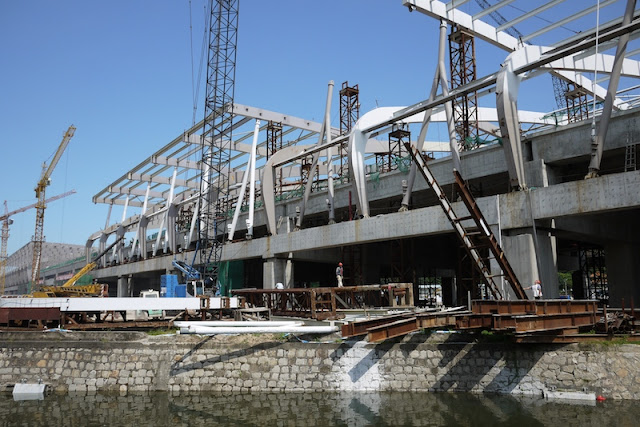 |
| A section further away from the Gongbei Port border crossing |
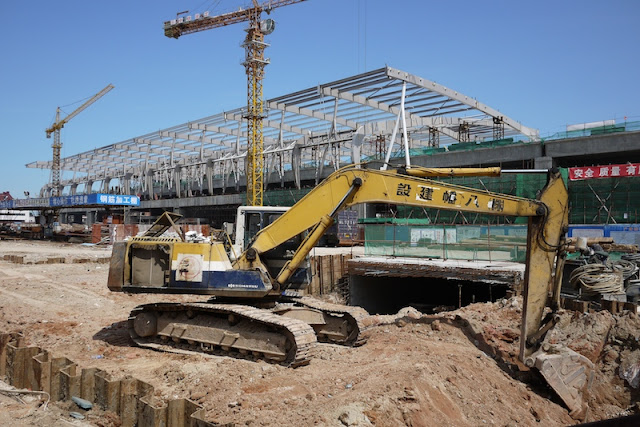 |
| An opportunistic photo closer to the Gongbei Port (security soon explained I was in a restricted area) |
Although it is not yet open, progress appears to be continuing on what should be a convenient transportation method for some of the people traveling to Macau -- even if all they want to do is buy safe baby formula, gamble large amounts of money, or eat good Portuguese food. And it is yet another sign that China's infrastructure is continuing to grow.
Update (March 4, 2013): The Zhuhai Train Station is now open. See the more recent post "The Good and Bad of the Extended High-Speed Guanzhou-Zhuhai Intercity Railway".
Monday, July 23, 2012
Shark-Friendly Soup in Macau
Posted by
Brian Glucroft
at
11:48 PM
Andrew Sullivan recently shared several pieces about shark fin sales covering topics ranging from the dispute over its ban in California to its strong market in Hong Kong. The eating of shark fins is an issue that has garnered much attention due to the practice of shark finning, where the fin is removed and then the shark is dumped back into the water still alive. However, not all shark fins are obtained through this process, and Sullivan mentions that "scientists and conservationists support managed fisheries over all-out legislative bans".
In a land rife with fake products, I have wondered how much of the shark fin soup sold in China actually includes genuine shark fin. So while walking around Macau last week this pot of soup sitting outside a restaurant caught my attention:
Regardless of whether customers primarily order the soup due to concerns about the welfare of sharks or a desire not to pay the higher price for genuine shark fin soup, this seems to be yet another potential way to reduce shark finning.
Chickens may have some objections though.
In a land rife with fake products, I have wondered how much of the shark fin soup sold in China actually includes genuine shark fin. So while walking around Macau last week this pot of soup sitting outside a restaurant caught my attention:
 |
| The value of advertising artificiality |
Regardless of whether customers primarily order the soup due to concerns about the welfare of sharks or a desire not to pay the higher price for genuine shark fin soup, this seems to be yet another potential way to reduce shark finning.
Chickens may have some objections though.
Friday, July 20, 2012
Skies and Clouds in China
Posted by
Brian Glucroft
at
5:53 PM
Something in all of the following scenes caught my attention earlier this week:
It was something that would not have caught my attention in the same way before my move to Shanghai 6 years ago. While living there I grew accustomed to only rarely seeing a type of sky that was far more typical where I had lived in the U.S. Regardless of whether Shanghai's common monotone grey skies were mainly due to the local climate or pollution, seeing blue skies with fluffy or wispy clouds seemed special in Shanghai.
However, during the summer of 2010 I noticed that Shanghai's sky appeared surprisingly "normal" on a regular basis. Was this due to a sudden change in climate? Doubtful. Instead, the dramatic change was due to government imposted measure intended to improve the air quality for the World Expo being held in Shanghai. The connection became "clearer" after the World Expo ended. High levels of pollution enveloped Shanghai and once more blotted out the sky. Yet again, everyone was paying a price for China's development. But at least more people knew what was possible.
While the Expo was open I commented to a Shanghainese friend that it was wonderful to see "normal" clouds in Shanghai. She laughed and said many of her Shanghainese friends were expressing confusion online about the "strange" clouds they were seeing. They were not used to such skies on a regular basis.
Their comments reminded me of a friend from nearby Nanjing. A few years earlier after she returned from Japan -- her first trip outside of China -- she told me she loved it there. I asked her, "Why?"
She quickly responded, "Because its sky is so blue!" When I later explained that the blue skies she saw were common in many cities outside of China she looked bewildered. She had assumed the type of sky she commonly saw in Shanghai was typical for cities everywhere.
So after my recent weeks in Shanghai it was with great joy I gazed upon the above scenes. But they are not from Shanghai. They are from one of China's two special administrative regions -- Macau:
I am not sure that the air was truly healthy, but the bluish sky and its clouds were nonetheless welcome. And they made a wonderful day of exploring Macau all the better.
The weather has been noticeably hotter than some of the more comfortable days during my time here several months ago. But I do not mind, I have been distracted by the sky.
 |
| A-Ma Temple |
 |
| Penha Church |
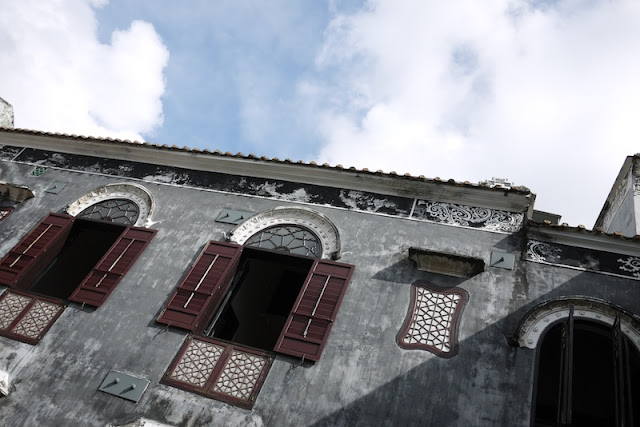 |
| Mandarin's House |
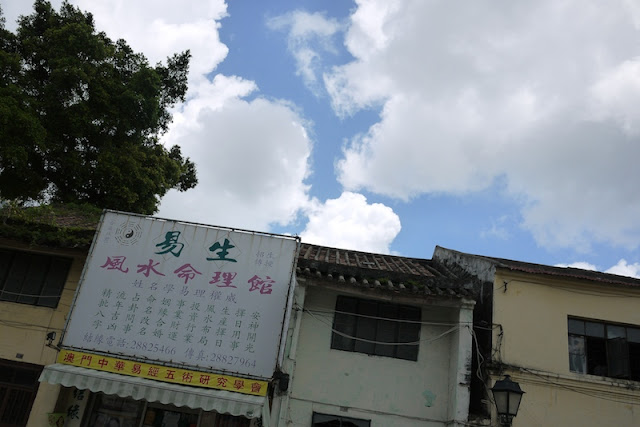 |
| Taipa Village |
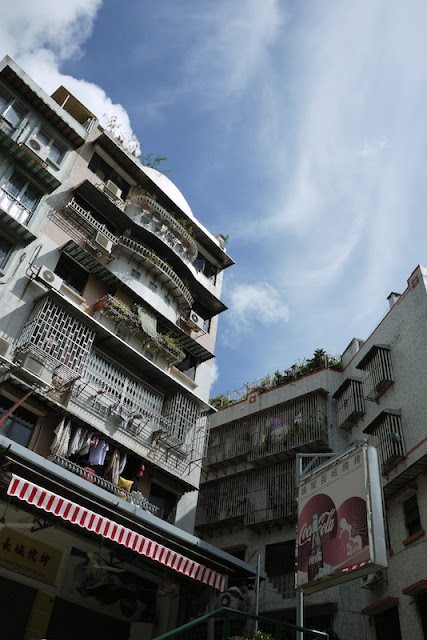 |
| Apartments and a Coca-Cola sign |
 |
| More colorful apartments |
 |
| Narrow alley in Taipa Village |
It was something that would not have caught my attention in the same way before my move to Shanghai 6 years ago. While living there I grew accustomed to only rarely seeing a type of sky that was far more typical where I had lived in the U.S. Regardless of whether Shanghai's common monotone grey skies were mainly due to the local climate or pollution, seeing blue skies with fluffy or wispy clouds seemed special in Shanghai.
However, during the summer of 2010 I noticed that Shanghai's sky appeared surprisingly "normal" on a regular basis. Was this due to a sudden change in climate? Doubtful. Instead, the dramatic change was due to government imposted measure intended to improve the air quality for the World Expo being held in Shanghai. The connection became "clearer" after the World Expo ended. High levels of pollution enveloped Shanghai and once more blotted out the sky. Yet again, everyone was paying a price for China's development. But at least more people knew what was possible.
While the Expo was open I commented to a Shanghainese friend that it was wonderful to see "normal" clouds in Shanghai. She laughed and said many of her Shanghainese friends were expressing confusion online about the "strange" clouds they were seeing. They were not used to such skies on a regular basis.
Their comments reminded me of a friend from nearby Nanjing. A few years earlier after she returned from Japan -- her first trip outside of China -- she told me she loved it there. I asked her, "Why?"
She quickly responded, "Because its sky is so blue!" When I later explained that the blue skies she saw were common in many cities outside of China she looked bewildered. She had assumed the type of sky she commonly saw in Shanghai was typical for cities everywhere.
So after my recent weeks in Shanghai it was with great joy I gazed upon the above scenes. But they are not from Shanghai. They are from one of China's two special administrative regions -- Macau:
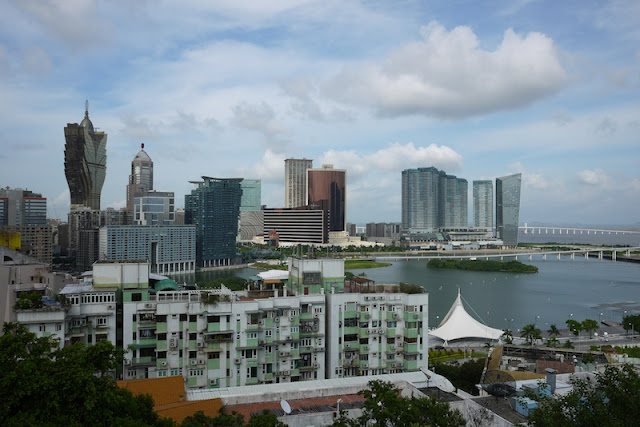 |
| Scene from Penha Hill |
I am not sure that the air was truly healthy, but the bluish sky and its clouds were nonetheless welcome. And they made a wonderful day of exploring Macau all the better.
The weather has been noticeably hotter than some of the more comfortable days during my time here several months ago. But I do not mind, I have been distracted by the sky.
Monday, May 14, 2012
Lives Remembered
Posted by
Brian Glucroft
at
3:33 AM
Over a month ago I stood here in Macau's Kun Iam Temple transfixed by all the faces from the past. I wondered about their lives--so many different stories I would never know.
Later that same day, I came across a similar scene at the Cemetery of Saint Michael the Archangel.
And again I thought about all of the lives and wondered what could be learned to help answer the question "What is life?"
I then slowly walked around looking at a variety of gravestones--some with a mix of Eastern and Western styles. One gravestone especially caught my eye.
A man who was not ethnically Chinese, but China had been the place of his birth and death. I wondered what stories he could have told. What brought his family to Shanghai? Why and when did he leave? What brought him to Macau? What did he experience in China during a time when it underwent immense changes and challenges?GEORGE V DO ROZARIOBORN IN SHANGHAI 21-7-1914DIED IN MACAU 2-8-1968SON OF JOSE MIGUEL DO ROZARIO AND OFIZA DO ROZARIOGONE BUT NOT FORGOTTENREST IN PEACE
My inability to find any answers leads me to ponder the phrase "Gone but not forgotten". What does it mean to be remembered? Why would it matter? How long will the gravestone last?
These experiences and questions come to my mind now due to the recent death of someone I knew. A man who began his life in the U.S. but found his end in Shanghai, a place where he discovered much that he enjoyed. Just days ago we were discussing the great variety of people that can be found in China.
I know more about him than the man who died in Macau. Yet as is highlighted by what others are now sharing online in a new form of an old ritual, I am sure there remains so much more I could learn. I am also sure that two men who had different journeys have something in common. They both impacted me and others. And I know the resulting changes are a form of remembrance, no matter what happens to their stories.
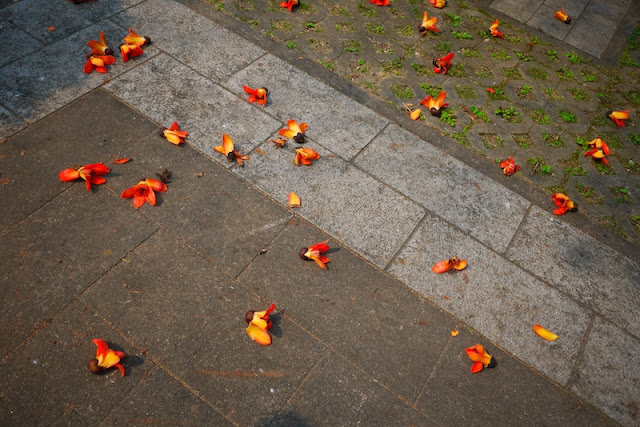 |
| Outside the Kun Iam Temple |
Thursday, April 19, 2012
Looking Back at Zhuhai from Macau
Posted by
Brian Glucroft
at
11:55 PM
Two earlier posts (here and here) included scenes in Zhuhai with Macau in the background--a special administrative region that mainland Chinese can only visit with a special permit. As a reminder, here is a photo from a popular "boardwalk" in Zhuhai with a view of Macau across the water:
Like many other times I visited here, there were numerous Chinese walking with family or friends, riding bikes, or having their photographs taken. In fact, the two umbrellas in the photo are for vendors who photograph customers for a price and then use a computer to quickly produce photos. Although there are other popular waterside walkways in Zhuhai where Macau cannot be seen, it appeared that visitors to this location were particularly drawn to the view of Macau.
I had often wondered how the area of Macau seen in the background would compare to this vibrant area in Zhuhai which was excellent for both enjoying the view and people watching. I answered my question during my most recent visit to Macau. Here is the view of Zhuhai from there on an overcast day:
The location where I took first photo in this post is near the tallest buildings. Although it was interesting to see Zhuhai from a new vantage point across the border, what most caught my eye was a bit closer:
There were very few people on the Macau side and no vendors of any type. The difference does not seem to be solely explainable by the weather since on the opposite side in Zhuhai I typically saw more people even on days with similar weather.
So what is the explanation for the difference? Is it because Macau offers a more interesting or photogenic skyline? Is it because the Zhuhai walkway itself is more appealing? Is it because the cities have different visitor numbers and demographics? Is it because the cities differ in what else they offer for ways to spend free time? Is it because Macanese can more easily visit Zhuhai than mainland Chinese can visit Macau? It is because Macau has a status in the eyes of mainland Chinese that Zhuhai does not have in the eyes of Macanese? Some of these explanations could be interconnected. Others are possible as well.
Whatever the reason, the difference in the number of people at the opposite waterfronts can be seen as symbolic of deeper differences. Compared to mainland Chinese, Macanese can travel to a far larger number of other countries without needing a visa. Macanese enjoy greater freedoms of expression and use an open Internet not censored by mainland China's Great Firewall. Macanese on average earn more money. Regardless that many mainland Chinese may not necessarily want to live in Macau, they may desire some of what Macau has to offer in a way that does not hold true for Macanese regarding mainland China.
It would be fascinating to know what people in Zhuhai are thinking when they gaze at Macau. It would also be fascinating to know what they would think upon learning that so few in Macau are gazing back.
Like many other times I visited here, there were numerous Chinese walking with family or friends, riding bikes, or having their photographs taken. In fact, the two umbrellas in the photo are for vendors who photograph customers for a price and then use a computer to quickly produce photos. Although there are other popular waterside walkways in Zhuhai where Macau cannot be seen, it appeared that visitors to this location were particularly drawn to the view of Macau.
I had often wondered how the area of Macau seen in the background would compare to this vibrant area in Zhuhai which was excellent for both enjoying the view and people watching. I answered my question during my most recent visit to Macau. Here is the view of Zhuhai from there on an overcast day:
The location where I took first photo in this post is near the tallest buildings. Although it was interesting to see Zhuhai from a new vantage point across the border, what most caught my eye was a bit closer:
There were very few people on the Macau side and no vendors of any type. The difference does not seem to be solely explainable by the weather since on the opposite side in Zhuhai I typically saw more people even on days with similar weather.
So what is the explanation for the difference? Is it because Macau offers a more interesting or photogenic skyline? Is it because the Zhuhai walkway itself is more appealing? Is it because the cities have different visitor numbers and demographics? Is it because the cities differ in what else they offer for ways to spend free time? Is it because Macanese can more easily visit Zhuhai than mainland Chinese can visit Macau? It is because Macau has a status in the eyes of mainland Chinese that Zhuhai does not have in the eyes of Macanese? Some of these explanations could be interconnected. Others are possible as well.
Whatever the reason, the difference in the number of people at the opposite waterfronts can be seen as symbolic of deeper differences. Compared to mainland Chinese, Macanese can travel to a far larger number of other countries without needing a visa. Macanese enjoy greater freedoms of expression and use an open Internet not censored by mainland China's Great Firewall. Macanese on average earn more money. Regardless that many mainland Chinese may not necessarily want to live in Macau, they may desire some of what Macau has to offer in a way that does not hold true for Macanese regarding mainland China.
It would be fascinating to know what people in Zhuhai are thinking when they gaze at Macau. It would also be fascinating to know what they would think upon learning that so few in Macau are gazing back.
Friday, April 6, 2012
Macau's Gambling World
Posted by
Brian Glucroft
at
11:51 PM
Given my recent explorations of Macau, it seems particularly appropriate to share the new article "The God of Gamblers - Why Las Vegas is moving to Macau" by Evan Osnos in The New Yorker. It provides an eye-opening account of Macau's gambling world -- a world that has caught the attention of several American (or at least previously American) companies and has in many ways surpassed Las Vegas:
In 2006, Steve Wynn, who led a revival of Las Vegas in the nineteen-nineties, opened a casino in Macau; he makes more than two-thirds of his global profits there. He is learning to speak Chinese, and he talks about moving his corporate headquarters to Macau. “We’re really a Chinese company now, not an American company,” he has said. Macau has become especially attractive to American corporations in the last few years. In Nevada, after tourism sank in 2008, gaming revenue plunged by nearly twenty per cent in two years, the largest decline in the state’s history. It later improved, but Nevada still has the highest unemployment and foreclosure rates in the country. Gary Loveman, the chairman of Caesars Entertainment, was one of the few casino bosses who passed up a chance to build in Macau. “Big mistake,” he said later. “I was wrong, I was really wrong.”Although the everyday lives of most people in China remain far from Macau's opulent casinos, the gambling scene touches on some important issues in China. For example, Osnos writes about the Chinese government's reluctance to crack down too much on Macau's gambling-related corruption:
Some officials in Beijing are keen to maintain the enclave’s economic success, because it shows the breakaway island of Taiwan the potential benefits of a return to the motherland. Moreover, Macau is a place where China’s new millionaires can indulge in the gains of their prosperity, which is one of the rewards guaranteed by the unwritten bargain between Chinese leaders and their people for a generation: Don’t concern yourself with the state’s inner workings, and the state will not overly concern itself with yours.I have observed thousands gamble at the world's largest casino in the Venetian Macau, passed the numerous stores selling luxury items in the City of Dreams, and over the years seen vast empty lots turn into billion dollar complexes. But I have spent most of my relatively brief time in Macau exploring its other sides. So instead of commenting further, I will simply recommend reading the article by Osnos and share just a few photos of places in Macau where plenty of gambling can be found.
 |
| The Wynn Macau and behind it the MGM Macau (the tri-colored building) |
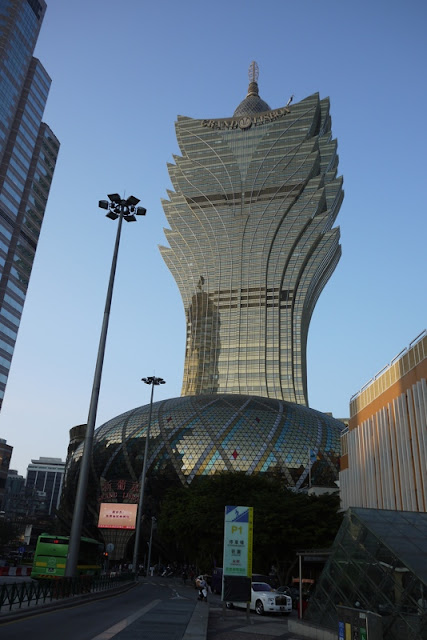 |
| The Grand Lisboa |
 |
| The City of Dreams (including the Hard Rock Hotel, the Crown Towers Hotel, and the Grand Hyatt Macau) to the left and the Venetian Macau to the right |
Saturday, March 31, 2012
A Long Trip for Milk: Barriers, Trust, and Truth in China
Posted by
Brian Glucroft
at
7:01 AM
During my visit to the top of Guia Hill in Macau I met someone new:
We met while we were both exploring historic Guia Fort. He lives in mainland China and was visiting Macau for the day. One topic he mentioned during our wide-ranging chat was the Internet censorship enabled by China's Great Firewall (which does not operate in Macau). He said it does not affect him as much as some of his friends since he works at a Taiwanese company which uses a VPN to securely (and freely) access the Internet. Regardless of his own situation, he believes the Great Firewall is unfortunate and should not exist.
In addition to the Great Firewall, there is another barrier in China that bothers him -- the borders between mainland China and China's special administrative regions of Macau and Hong Kong.
Despite possessing the passport-like pass mainland Chinese need to enter Macau, for each visit he must apply for a new visa-like permit to be placed in it. As with China's Great Firewall, he wants the border removed and believes it is not fair to mainland Chinese.
What most caught my attention was what brought him to Macau. Although he enjoyed seeing the sights, his primary goal was purchasing the customs maximum two cans of New Zealand baby formula. Like cigarettes and diapers, baby formula is a common product brought to mainland China by those coming from Macau. Due to past milk scandals his cousin with an infant does not trust the milk products produced in China. Approximately every two months he plans to take a more than hour-long bus ride from the city where he lives to the Macau border, pass through two immigration channels, purchase baby formula, pass through immigration again, and take another long bus ride back home -- all in one day.
I asked him why he did not save himself the trip and purchase the New Zealand baby formula through a source closer to his home. He said his family would not be able to trust its origin due to the vast numbers of fake products found in mainland China. When I asked him why fake products were such a problem he replied, "The Chinese government often lies to the people. So, the people..." He did not finish the sentence and simply looked away with an expression I am hesitant to interpret. I will just say that it did not at all appear to be positive.
He may not agree with some of China's policies. He may be wary of China's milk. He may not trust all of what he hears from China's government. But despite his frustrations, his story does suggest signs of positive recent changes in China. He was doubtful he would have as easily obtained a permit to visit Macau only 10 years ago. And I am not sure whether 10 year ago he would have as openly expressed himself or he would have given permission to publicly share his thoughts with his photo included.
Regardless, he feels conditions still need to improve for himself and others in China. And sometimes he is willing to take a long journey to help it happen.
We met while we were both exploring historic Guia Fort. He lives in mainland China and was visiting Macau for the day. One topic he mentioned during our wide-ranging chat was the Internet censorship enabled by China's Great Firewall (which does not operate in Macau). He said it does not affect him as much as some of his friends since he works at a Taiwanese company which uses a VPN to securely (and freely) access the Internet. Regardless of his own situation, he believes the Great Firewall is unfortunate and should not exist.
In addition to the Great Firewall, there is another barrier in China that bothers him -- the borders between mainland China and China's special administrative regions of Macau and Hong Kong.
 |
| Pass (通行证) required for mainland Chinese to enter Macau or Hong Kong |
Despite possessing the passport-like pass mainland Chinese need to enter Macau, for each visit he must apply for a new visa-like permit to be placed in it. As with China's Great Firewall, he wants the border removed and believes it is not fair to mainland Chinese.
What most caught my attention was what brought him to Macau. Although he enjoyed seeing the sights, his primary goal was purchasing the customs maximum two cans of New Zealand baby formula. Like cigarettes and diapers, baby formula is a common product brought to mainland China by those coming from Macau. Due to past milk scandals his cousin with an infant does not trust the milk products produced in China. Approximately every two months he plans to take a more than hour-long bus ride from the city where he lives to the Macau border, pass through two immigration channels, purchase baby formula, pass through immigration again, and take another long bus ride back home -- all in one day.
I asked him why he did not save himself the trip and purchase the New Zealand baby formula through a source closer to his home. He said his family would not be able to trust its origin due to the vast numbers of fake products found in mainland China. When I asked him why fake products were such a problem he replied, "The Chinese government often lies to the people. So, the people..." He did not finish the sentence and simply looked away with an expression I am hesitant to interpret. I will just say that it did not at all appear to be positive.
He may not agree with some of China's policies. He may be wary of China's milk. He may not trust all of what he hears from China's government. But despite his frustrations, his story does suggest signs of positive recent changes in China. He was doubtful he would have as easily obtained a permit to visit Macau only 10 years ago. And I am not sure whether 10 year ago he would have as openly expressed himself or he would have given permission to publicly share his thoughts with his photo included.
Regardless, he feels conditions still need to improve for himself and others in China. And sometimes he is willing to take a long journey to help it happen.
Friday, March 30, 2012
Guia Hill in Macau, China
Posted by
Brian Glucroft
at
11:53 PM
Similar to Jingshan Park in Zhuhai there is an easy way to the top of Guia Hill in Macau:
And also similar is that I decided to take the stairs to the top. There I met a couple of birds:
I also saw an interesting bug:
And while enjoying some unique views of Macau:
I confirmed that playing with bubbles is not only enjoyable for children:
But the top of the hill is most famous as the site for the historical Guia Fort which includes this chapel built in 1622 and lighthouse built in 1865 -- both periods during Portugal's long control of Macau:
Although I very much enjoyed all of the above, it is something else about my visit to Guia Hill that most stands out in my mind. I will share it in the next post.
And also similar is that I decided to take the stairs to the top. There I met a couple of birds:
I also saw an interesting bug:
And while enjoying some unique views of Macau:
I confirmed that playing with bubbles is not only enjoyable for children:
But the top of the hill is most famous as the site for the historical Guia Fort which includes this chapel built in 1622 and lighthouse built in 1865 -- both periods during Portugal's long control of Macau:
Although I very much enjoyed all of the above, it is something else about my visit to Guia Hill that most stands out in my mind. I will share it in the next post.
Subscribe to:
Posts (Atom)




